Producing safe, nutritious & affordable food - more sustainably
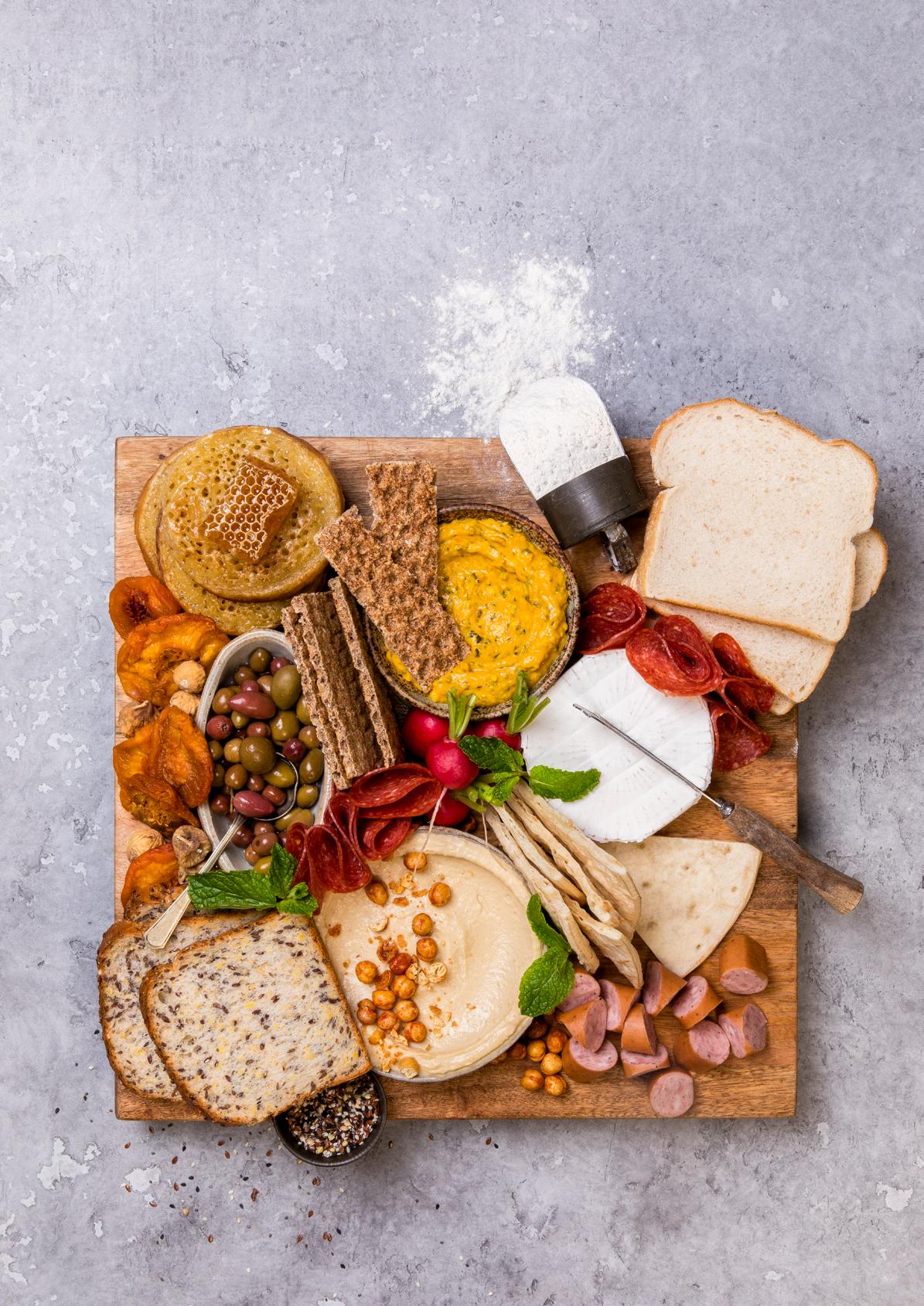
GWF'S 2023 SUSTAINABILITY REPORT
GWF’s Sustainability Report
GWF and its businesses acknowledges the Traditional Owners, Custodians and First Nations of Australia. We pay our respects to their Elders, past, present, and emerging, for they hold the memories, the tradition, and the culture of all Aboriginal and Torres Strait Islander people.
We recognise the unique role Māori as Tangata Whenua and embrace Te Tiriti o Waitangi recognising Māori as tino rangitiratanga of Aotearoa/New Zealand while embracing the guiding principles of the Treaty.
This is George Weston Foods’ (GWF) 2023 Sustainability Report. It details our approach to sustainability across our business, our recently developed Sustainability Framework and eight priorities distilled from a recent Materiality Assessment. The Report also highlights sustainability performance information, case studies and our Roadmap for 2023-2030. For the purposes of this document, the GWF Group encompasses information from Tip Top®, DON®, Jasol, MAURI and Yumi’s. Please note Yumi’s is a separate legal entity to GWF. Our report is prepared with reference to the Global Reporting Initiative (GRI) Standards. We welcome feedback or questions on our reporting to sustainability@gwf.com.au

Contents 2 Introduction 4 Executive Summary 5 CEO’s Message 6 Our Commitments & Progress in 2022 – Products 7 – People 15 – Planet 25 34 GWF’s Sustainability Framework 40 Sustainability Roadmap 2023-2030 44 Materiality Assessment 46 Our Governance 48 About GWF 1 // GWF's 2023 Sustainability Report Producing safe, nutritious and affordable food – sustainably
At George Weston Foods, we have a clear sense of our social purpose, providing safe, nutritious, and affordable food to millions of Australians and New Zealanders every week. We do all of this while not losing sight of our responsibilities and ambitions for the future. Namely, to reduce our impact on the planet, provide a safe and inclusive workplace, seek to source ingredients from ethical, responsible, and sustainable sources, and support the communities in which we operate and those most in need.
The next chapter in GWF’s sustainability journey
In our 2021 Sustainability Report we detailed that GWF was about to embark on a new phase of its sustainability journey, building on past foundations. We flagged that we would develop a GWF-wide Sustainability Framework that would help guide our businesses, and from that develop a Sustainability Roadmap outlining what we hope to achieve across the Environment, Social and Governance (ESG) landscape over the next few years. GWF seeks to develop and enact this roadmap in co-operation with our key stakeholders, customers, and suppliers, with Governments at all levels in Australia and New Zealand, with our parent company ABF (Associated British Foods) and importantly, with our staff.
This latest Report marks Stage 1 in GWF’s sustainability journey, with the development of a Sustainability Framework and an associated Materiality Assessment for each business. From here, we begin the development of a Sustainability Roadmap to be finalised by end 2023, with details included in our 2024 Sustainability Report, along with the resultant goals and actions to be taken over the coming years. Individual businesses within GWF may also report their individual sustainability roadmaps and progress.
George Weston Chief Executive Officer, Associated British Foods

Introduction
Many of our businesses have been running sustainability-related programmes for decades and have achieved consistent performance improvements
We look to continuously improve our products, our people and the environment we operate in
2 // GWF's 2023 Sustainability Report Producing safe, nutritious and affordable food – sustainably
Plc
Across GWF for many years sustainability work has gone on. Whether it be energy efficiency measures across our facilities, looking to reduce food waste towards zero, reducing the amount of plastic packaging in our products, reducing the sugar and salt levels in our products where appropriate to do so, establishing safety as a value rather than a priority, or embedding inclusion and diversity within our businesses, we look to continuously improve our products, our people, and the environment we operate in.
1
this Report including:
World class feed mill in Hope Valley
Construction of a new $100 million world class Mill in Hope Valley, Perth, Western Australia, that will underpin the quality feed needs for Western Australian Agriculture for decades to come.
4
Inclusion and Diversity programs
The development of award-winning Inclusion and Diversity programs across our businesses.
3
Becoming a founding member of National Plastics Recycling Scheme (NPRS)
GWF becoming a foundation member of the NPRS, designed to be Australia’s first and best total solution to recycling soft plastics.
2
A new energy future at DON Castlemaine
Investing in a new energy future at DON Castlemaine facility, Victoria, by seeking to develop new large solar supply and continuing to work with the local community on a unique green energy facility.
The progress we have made is highlighted in the case studies featured in
3 // GWF's 2023 Sustainability Report Producing safe, nutritious and affordable food – sustainably
Executive Summary
The GWF Sustainability Framework that is contained in this report consists of three integrated pillars, broadly common to our parent ABF.
Products People Planet
Our Materiality Assessment , with input from each of our businesses and external stakeholders revealed many issues. In assessing them, GWF prioritised those most significant to our business and our stakeholders in terms of risks and impacts.
We distilled the issues into eight priorities under the three framework pillars:
This report outlines how we determined these priorities and our commitments and progress we have made in 2022; including case studies that highlight how the initiatives have contributed to our sustainability commitments.
Unless otherwise stated, this Sustainability Report covers the period 1 October 2021 to 31 December 2022 for GWF and its businesses. In addition, it details the Sustainability Framework and further steps to refine a Roadmap for GWF and its business in the coming five to ten years.
Products
1. Food Safety, Quality, and Innovation
2. Packaging & Waste (also Planet)
People
3. Animal Welfare
4. Safety
5. Inclusion & Diversity
Planet
6. Protecting Human Rights & Eliminating Modern Slavery
7. Climate Change, Energy & Emissions
8. Climate Adaption & Resilience
4 // GWF's 2023 Sustainability Report Producing safe, nutritious and affordable food – sustainably
CEO’s message
Welcome to our 2023 GWF Sustainability Report
Sustainability is considered every day across GWF, because it’s about investing in our future. The future of our great staff and the products they produce that touches most Australian households.
GWF has a clear sense of our social and economic purpose in Australia and New Zealand. Every day, over 6,000 employees work hard to provide safe, nutritious and affordable food to our many customers. Like our parent, Associated British Foods Plc, we strive to be a good neighbour and contribute positively to the communities in which we operate.
GWF sets its sustainability goals and targets based on the needs and plans of our businesses. We believe that this bottom-up approach to sustainability, while perhaps more difficult to report, also delivers much better outcomes for our businesses and customers.
The last couple of years have been tough for our company, but more so for our people. Devastating flooding in parts of Australia across 2022, and the ongoing impacts of the COVID-19 pandemic, are reminders of the environmental and social challenges Australia and New Zealand faces.
GWF knows that as a large business with thousands of employees, an extensive supply chain, and touching so many different parts of Australia and New Zealand, we can change for the better.
Last year in our first report we set out what GWF had been doing to support sustainability, both in our business and in the community. We also set out our next steps forward.
This year’s report lays out the “sustainability framework” that will guide our strategy on environmental and social issues that affect GWF and the community in which we work. It then sets out the next steps to develop the key strategies that will drive GWF and our businesses forward.
As this report and the previous one shows, GWF and its businesses have already done a great deal towards a more sustainable future. Realistically, however, we know there is more we can and must do. The framework that is set out in this report and the roadmap that it outlines for the future, set out the key goals and themes that GWF will undertake in the next five to ten years.
The scale of the challenges we are grappling with as a society– including climate change, food nutrition, waste, recycling, as well as social and economic inclusion – means GWF cannot act alone. GWF believes that partnerships with our customers, our suppliers, as well other key stakeholders including governments, are key to how we operate. We know that when we work together, we can make a real difference for communities in which we live and work.
Stuart Grainger Chief Executive Officer, George Weston Foods

5 // GWF's 2023 Sustainability Report Producing safe, nutritious and affordable food – sustainably
GWF'S COMMITMENTS & PROGRESS IN 2022
GWF has already undertaken substantial progress and made commitments across our eight sustainability priorities:
FOOD SAFETY, QUALITY & INNOVATION
PACKAGING & WASTE
ANIMAL WELFARE
GWF’s purpose
CLIMATE CHANGE, ENERGY & EMISSIONS
CLIMATE ADAPTION & RESILIENCE
Great quality food at an affordable price, made safely. People
PROGRESS ON OUR PRIORITIES IN 2022
SAFETY
INCLUSION & DIVERSITY
PROTECTING HUMAN RIGHTS & ELIMINATING MODERN SLAVERY
Across our eight (8) priorities that we will concentrate on to finalise our GWF Sustainability Roadmap building on the progress we have made to date.
P r o d stcu tenalP
6 // GWF's 2023 Sustainability Report Producing safe, nutritious and affordable food – sustainably
Products
We are committed to deliver value for customers, ensuring products are safe, consistent in quality, and support good health.
FOOD SAFETY, QUALITY & INNOVATION
Food safety and quality is the most important topic for GWF and its key stakeholders. As one of the largest food manufacturers, we have the fundamental duty to the communities to supply safe food to nourish their families. In addition to ensuring our products are safe, we are also committed to play our part to address food insecurity, delivering consistent quality and nutritious foods to our communities.
Food safety & quality
We are constantly seeking to improve and enhance our Food Safety & Quality programs. Three years ago, we embarked on a Food Safety & Quality Culture journey where we have implemented a series of hearts & mind shifting training, data driven processes, and process consistency programs. As a result, we have seen a significant increase in pride our people have with the product they make, and significant reduction of consumer complaints, and more importantly, meeting our customers and consumers expectation.
Food innovation
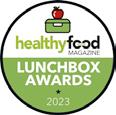
Innovation is key to growth and staying relevant. We are always innovating across both product and packaging to meet the changing demands of customers and consumers through the development of a broad range of high quality, nutritious and affordable offerings. Two of the key areas of focus for our Innovation Hub are ‘Health & Permissibility’ and ‘Sustainability;’ the hub explores these areas conducting deep immersions to better understand the unmet needs of our consumers and customers allowing us to develop highly relevant new products and/or packaging solutions e.g.: Bürgen Prebiotic and Bürgen 85% Lower Carb, High Protein loaves.
Award winning innovations:
White Bread: Tip Top
Wholemeal Bread: Abbott's Bakery
Best Bread: BÜrgen 85% Lower Carb (winner), Tip Top 9 Grain (finalist)
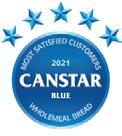
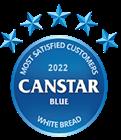
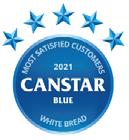
We are relentless in our quest for developing the highest food safety standards
FOOD SAFETY, QUALITY & INNOVATION 7 // GWF's 2023 Sustainability Report Producing safe, nutritious and affordable food – sustainably
Progress in 2022
GWF and Health Star Rating system
GWF is an active participant in the Government’s Health Star Rating system. This is a voluntary front of pack labelling system to educate consumers on the healthiness of foods. Currently all Tip Top products now have health star rating displayed on pack in accordance with the scheme. Tip Top is continually trying to improve the nutritional profile of its products and currently over 87% of its products have a Health Star Rating of 3.5 or more. Yumi’s is progressively working through to include this in all its products.
Improving the health benefits of bread
Sugar and artificial additives, including taking all added sugar out if its sliced breads, even fruit bread. Since 2007, the business has removed 510 tonnes of salt from Australian diets; and since 2018, taken more than 144 tonnes of sugar out of the food supply.
To lead in supporting consumers who care about their gut health, the business has also launched BÜrgen Prebiotic bread, which has been shown to nourish benign gut bacteria. Tip Top was also the first bakery brand to adopt the Australian Government’s Health Star Rating system.
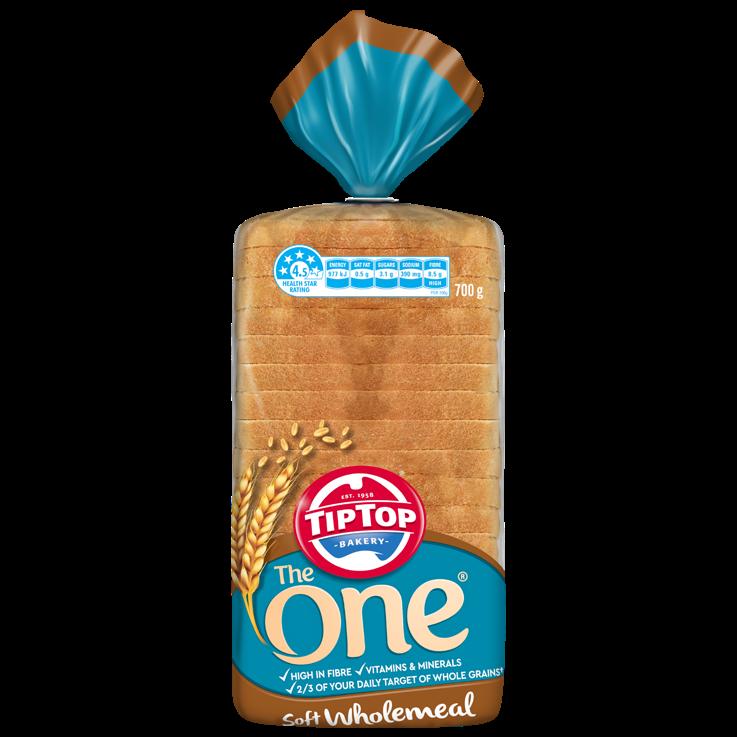
FOOD SAFETY, QUALITY & INNOVATION
over 87% of TIP TOP'S products have a Health Star Rating of 3.5 of more
8 // GWF's 2023 Sustainability Report Producing safe, nutritious and affordable food – sustainably
PACKAGING & WASTE (ALSO PLANET)
As signatories to Australian Packaging Covenant Organisation (APCO) 2025 National Packaging Targets we continue to encourage uptake of innovative, sustainable product packaging and reducing reliance on problematic packaging materials. We take responsibility for the lifecycle of the products we sell to reduce waste and environmental impact, including impacts from food waste.
Commitments and progress in 2022
GWF and the National Plastics Recycling Scheme (NPRS)
GWF is a foundational member of the National Plastics and Recycling Scheme - being developed by Australia’s food and grocery manufacturing industry with funding support from the federal government. The NPRS will create a new advanced recycling industry here in Australia, turning plastic packaging back into new food-grade packaging. This creates a circular plastics loop and cleaner recycling streams, including for paper and cardboard.
How the NPRS will work:
– Food and grocery manufacturers may pay a levy to cover incremental costs and coordination
– Collection of soft plastic packaging will be expanded through a trial kerbside collection program
– Bags are extracted from recycling streams at sorting facilities and sent for processing
– These advanced recycling facilities will then break the plastic back down into oil
– That ‘plasticrude’ oil is then reprocessed, ready to become high quality, food-grade plastic packaging again
Benefits of the scheme:
– Turn a material regarded as problematic and waste into a valuable resource
– Reduce plastic litter, particularly around landfills and recycling centers
– Divert a resource from landfills and create a more sustainable and circular economy
– Cut Australia’s carbon emissions by 50% for every tonne of soft plastics used and reprocessed
PACKAGING & WASTE
9 // GWF's 2023 Sustainability Report Producing safe, nutritious and affordable food – sustainably
Tip Top recycled and recyclable bread bag tags
Tip Top Bakeries has successfully launched Australia’s first 100% recycled and recyclable cardboard bread tags.

They are now in use nationwide for fresh bakery items in Australia and in New Zealand. Switching to recyclable tags, made from 100% recycled cardboard, means we will be preventing approx. 300 million plastic tags from ending up in our Aussie waste streams. Consumer awareness of the new tags is increasing and around 60% of consumers in Southern Australia say that their use makes them more likely to buy the product.
Tip Top Bakeries has removed around 105 tonnes of polystyrene from waste streams every year as part of its commitment that by 2025 all its packaging will be 100% recyclable, reusable or compostable.
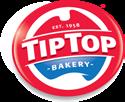
Switching to recyclable bread bag tags is preventing approx. 300 million plastic tags from ending up in our Aussie waste streams
The NPRS will be developed in three phases over three years:
– First, trials of curbside collection models and bag formats will be conducted in ~8 local councils in 2022-23
– Phase 2 will expand to more households in more council areas to prove costs and benefits
– Phase 3 from 2024 will see larger collections, and larger reprocessing in facilities in Victoria and New South Wales
GWF’s Packaging Management Team
The NPRS is a critical part, but not the only part of a GWF and businesses plastics and packaging strategy.
Businesses within GWF have formed a Packaging Management Team to address packaging issues more generally and develop communities of practice to share innovations.
PACKAGING & WASTE 10 // GWF's 2023 Sustainability Report Producing safe, nutritious and affordable food – sustainably
Our Australian Packaging Covenant Organisation (APCO) Targets.
As part of APCO, GWF has committed to the 2025 National Packaging Targets of Australia and those endorsed by New Zealand:
100% of all packaging will be reusable, recyclable, or compostable by 2025 or earlier
70% of plastic packaging will be recycled or composted by 2025
50% average recycled content will be included across all packaging by 2025
Problematic and unnecessary single-use plastic packaging will be phased out through design, innovation, or introduction of alternatives
DON Smallgoods transforming food packaging

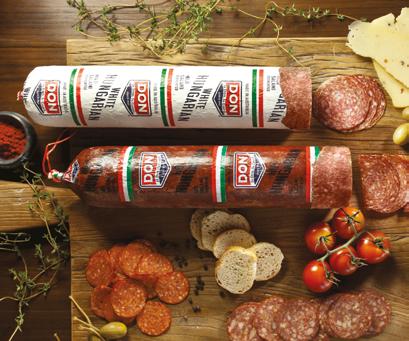
DON is converting all its thermoforming rigid packaging machines to Mono PET bottom web, which is 100% kerbside recyclable. The top web that is used on the packs is being developed to meet the requirements of soft plastics recycling. This is a challenging process as DON Smallgoods produces perishable meat-based products, so the business has had to find solutions that meet the criteria for recyclable as well as food safety.
This transition will result in 720 tonnes of plastic packaging per year moving from non-recyclable to recyclable. DON’s first packaging lines were converted to use the recyclable material at the end of 2021 with all its other rigid production thermoforming lines set to do so by the end of 2024.
DON’s transition to recyclables will result in 720 tonnes of plastic packaging per year moving from non-recyclable to recyclable
PACKAGING & WASTE
11 // GWF's 2023 Sustainability Report Producing safe, nutritious and affordable food – sustainably
Food Waste
In 2022 Tip Top Bakeries became a signatory of the Australian Food Pact which aims to halve food waste in Australia by 2030. Tip Top Bakeries in Australia send less than 1% of what they produce to landfill, most of the waste not fit for human consumption is sent to animal feed. However, we are working to reduce this even further. We have engaged with technical experts from Stop Food Waste Australia (SFWA) and will also investigate if food waste can be moved up the food recovery hierarchy, for example if food that is currently sent to animal feed can be upcycled or donated to charity. We will also explore ways to reduce food waste in the home-through educating our consumers and employees.

Introducing recycled plastic bread bags
Ploughmans Bakery in New Zealand is the first and only bakery brand to introduce recycled plastic into its bread bags from May 2022. By using Post Industrial Recycled Plastic, Ploughmans Bakery has reduced its use of virgin plastic by 30%.
Ploughmans in New Zealand using post-industrial recycled plastic in its bread bags
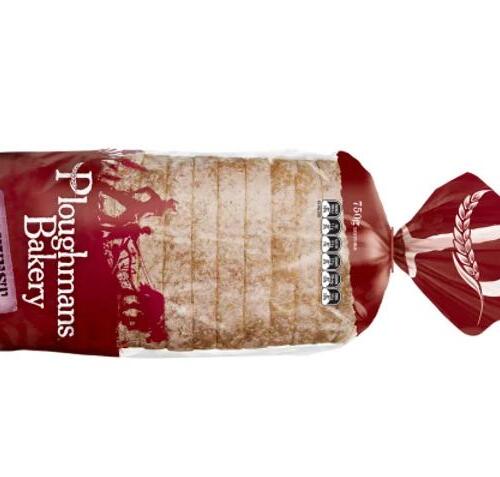
Tip Top is a signatory to the Australian Food Pact which aims to halve food waste in Australia by 2030.
PACKAGING & WASTE
12 // GWF's 2023 Sustainability Report Producing safe, nutritious and affordable food – sustainably
ANIMAL WELFARE
We believe in maintaining and improving good animal welfare and meeting relevant animal welfare standards. Whilst principally DON and Tip Top have direct involvement with animals, we see this as a highly material issue across all our brands.
Commitments and progress in 2022

– GWF follows and endorses the policy of our parent company, Associated British Foods Plc, with respect to animal welfare. By 2025 DON aims to have moved to at least tier 3 or above on the Business Benchmark Farm Animal Welfare (BBFAW) scale; and in conjunction with other GWF businesses during 2023, will work on a roadmap designed to implement actions across our Farms, Procurement, and Animal Welfare Policy.
– ABF’s policy on Animal Welfare can be found at: ABF022-animal-health-and-welfare-policy-1710
ANIMAL WELFARE
13 // GWF's 2023 Sustainability Report Producing safe, nutritious and affordable food – sustainably
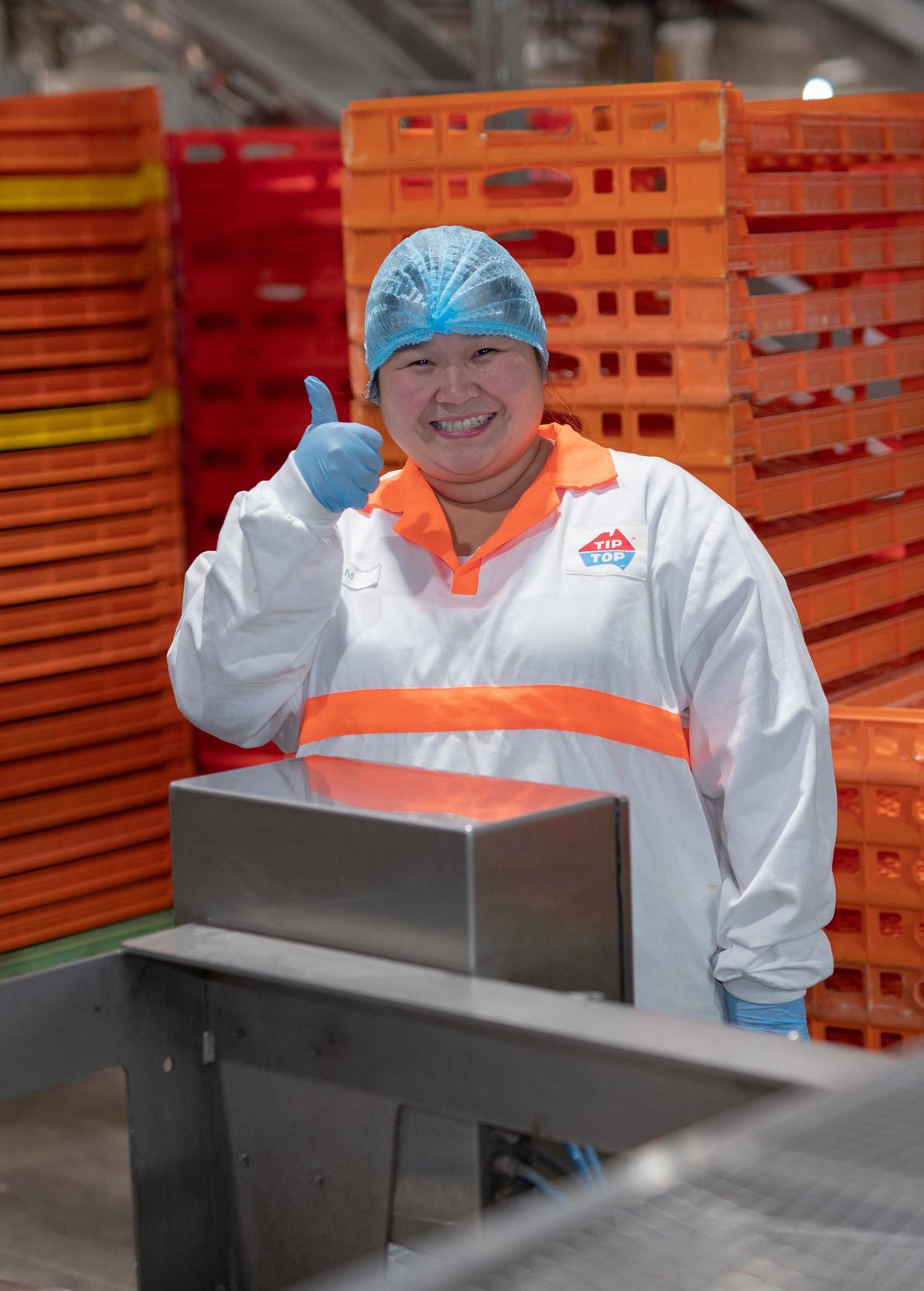
14 // GWF's 2023 Sustainability Report Producing safe, nutritious and affordable food – sustainably
People
Embedding workplace health, safety and wellbeing is a consistent focus area for GWF and all its businesses. This means prioritising employee health and wellbeing, including mental health. We strive to meet workplace health and safety standards to keep our people safe.
Commitments and progress in 2022 SAFETY
GWF’s Group Leadership Team recognises the importance of ensuring the highest standards of Health, Safety and Environment. Safety remains the first of our 4 values at GWF.
We continue to base our activities in each of our businesses around our 5 strategic safety pillars, namely shifting the mindsets of our people in terms of safety. We continue the work to ensure that we are being increasingly aware of risks in our workplaces and how we contain them.
We saw more progress in ensuring that our processes remain established and stay embedded with our people. We reinvigorated our training programmes to help us continue to develop our people’s skillset and competencies in both safety and health. Finally, the work continued in relation to making our systems of work simpler and ensuring that we involve the people who are closest to the work.
Despite all this effort, our overall GWF group safety performance deteriorated when compared to 2021. Whilst we saw overall injury rates increase slightly year on year, we were pleased to see that nearly half of our operating sites are lost time injury free. We are determined to improve safety performance, we have the right strategy, the work continues.
5 STRATEGIC PILLARS
Shift Mindsets Contain The Risk
Develop Skillset &Competencies
in every part of our business SAFETY 15 // GWF's 2023 Sustainability Report Producing safe, nutritious and affordable food – sustainably
EstABLISH PROCESSES System Improvements
Our daily actions are reflecting the importance of safety
Safety Leadership Programs
GWF has developed a suite of leadership programs provides tools and frameworks for leaders, along with a common language.
Our ‘Leaders Leading Safety Well’ program prepares the cultural ground for building capability at the frontline.
Our ‘Steps to Zero’ program aim to inspire everyone to work safely so that, at the end of each working day, everyone goes home to their families, healthy and safe.

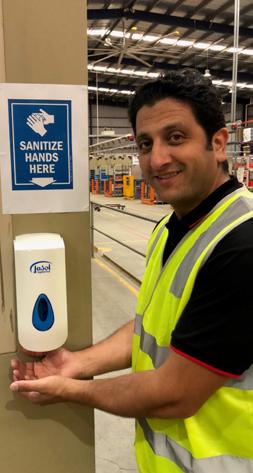

The program is based on 3 premises:
1 We care about each other
2 We believe that zero harm is possible
3 We hold each other accountable
SAFETY 16 // GWF's 2023 Sustainability Report Producing safe, nutritious and affordable food – sustainably
Tip Top Safety Program Chilled and Frozen Onsite health hub
Tip Top Bakeries in Australia has taken action to prevent workplace injuries by creating an on-site health hub at our bakery sites. Tip Top tries to reduce the risks of manual handling (a major cause of injury) through automation, better equipment, and processes, but the human factor remains.
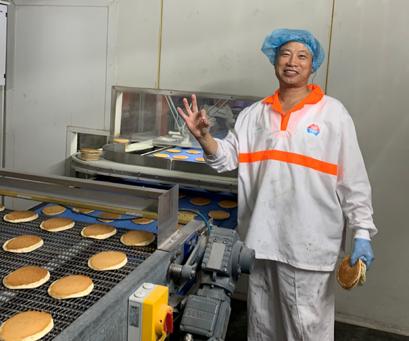

To address this, Tip Top has partnered with a business called Employhealth to provide on-site physio support to its employees.
The services offered to employees include:
– Free health assessments in line with employees’ roles on-site
– Strengthening programmes – or ‘prehab’ to address personal fitness issues
– Daily warm-up programme
– Manual handling good technique training
Tip Top has also run an eight-week health and wellbeing challenge on an annual basis. Since the new service was introduced in 2020, 12 sites have health hubs established and more than 900 employees have completed health assessments. Many of these employees have also completed strengthening programmes.
GWF is assessing the benefits of adopting this approach for its businesses in Australia and New Zealand.
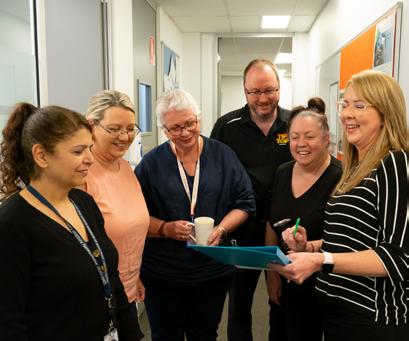
INCLUSION & DIVERSITY
17 // GWF's 2023 Sustainability Report Producing safe, nutritious and affordable food – sustainably
CHAMPIONING INCLUSION & DIVERSITY
To bring inclusion and diversity to life, GWF and its business units have established an Inclusion and Diversity Taskforce.
This ensures we are continually reviewing and embedding practices to build an inclusive and diverse workforce. We also actively support and celebrate our diverse workforce throughout the year with network events, celebrations, education, and communication.
In 2022 and into 2023 GWF has educated many of our leaders and people on unconscious bias; and continue to implement recruitment policies and practices that drive our inclusion and diversity philosophies, and these are measured at a business unit level to ensure adherence.
As a company that has a large part of our workforce and operations located in regional Australia, and dependent so much on how we manage our land to provide us with the produce that we need to produce the products so many Australians enjoy, GWF understands the unique position that First Nations peoples occupy in our country.
Inclusion and Diversity - Community
Tip Top’s partnership with NRL Cowboys as a ‘Friend of the House’

In September 2022 Tip Top formalised a partnership with The NRL Cowboys House as a ‘Friend of the House’ marking our commitment to improving the lives of young Indigenous people and their families. The Cowboys Community Foundation was established in Townsville in 2015, to improve the lives of indigenous individuals, families, communities, and the economy through equitable access to education, training, and employment.
The partnership flourished after a visit to the House left a lasting impression. We share the Cowboys Community Foundation commitment to ensuring students have access not only to nourishing meals but the education and knowledge to make the right food choices.

INCLUSION & DIVERSITY
18 // GWF's 2023 Sustainability Report Producing safe, nutritious and affordable food – sustainably
Tip Top Improving the lives of indigenous individuals, families, communities and the economy
GWF improving benefits for parents and carers
GWF has enhanced the benefits it offers to parents and carers and their families.
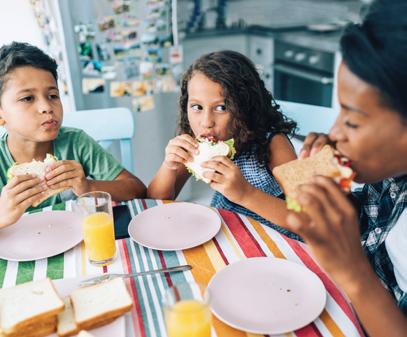
The new benefits include ongoing payment into state-run saving schemes throughout paid and unpaid parental leave, an ‘ease-back’ to work process offering new parents or carers one paid day a week off for 12 weeks to help them manage the process of coming back to work. We also fund with a ‘first aid for families’ course for new parents.
GWF has also acted to ensure all policies and communications supporting these benefits are inclusive and gender neutral; and the business has a very high retention rate following post-parental leave of 92%.
New benefits help parents and carers manage the process of coming back to work
Commitments and progress in 2022
– 27.7% of manager roles and 35% of the top 130 positions are held by women (2022 Workplace Gender Equality Agency data)
– We have made significant progress attracting, developing, and promoting women in Operational leadership roles and have introduced a Women in Operations forum to provide a focus for continuing to grow women’s careers. Within professional workgroups we have achieved gender parity and we are seeing more women being employed in technical, trades and machinery operator role
– Our business units have set goals toward creating more inclusive cultures and we are utilising a global framework to measure our I&D maturity
– In addition to gender, each business unit has a unique focus reflecting the needs of their workforce and these include age, race and ethnicity, First Nations people, disability and LGBTQI+
INCLUSION & DIVERSITY
19 // GWF's 2023 Sustainability Report Producing safe, nutritious and affordable food – sustainably
DON Smallgoods Pacific Australia Mobility Scheme (PALMs)
DON Castlemaine in regional Victoria is facing a significant labour shortage severely affecting its ability to meet demand from customers for its products.
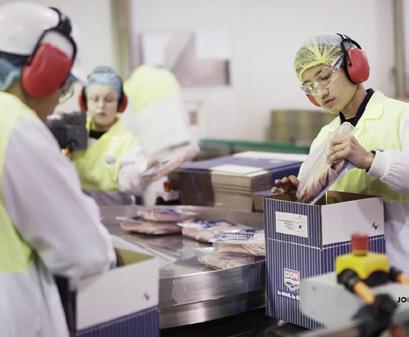
DON has worked in partnership with the Australian Government to access the Pacific Australia Labour Mobility Scheme – accessing workers from nine South Pacific countries and Timor Leste when there are not enough local workers available. DON has an agreement through the scheme to recruit up to 100 workers, in this case from the Solomon Islands. Through the scheme, workers are able develop their skills and send income home to support their families and communities for up to 4 years on approved Australian labour standards including wages and hours of work.
The impact for DON Smallgoods has been significant. The immediate injection of workers has seen DON better meet demand through increased production. About half of the cohort from the Solomon Islands have already been promoted into higher duties after appropriate training. The introduction of the workers has highlighted that workers from Pacific nations can be successfully welcomed into Australian workplaces and regional communities while retaining their own cultural and community values and identity.
DON is looking to ensure that the Solomon Island workers are retained to enable production to remain at required levels, while continuing the successful transition of the workers to the Castlemaine community.

INCLUSION & DIVERSITY
20 // GWF's 2023 Sustainability Report Producing safe, nutritious and affordable food – sustainably
Workers are able develop their skills and send income home; and DON has been able to meet demand through increased production
Supporting communities
While GWF supports many local charities and community groups, our major focus is on providing basic food to those in our communities that are most in need. Through 2022, GWF and our businesses have deepened our commitment to both Foodbank in Australia and KidsCan in New Zealand.
GWF recognises that post COVID, and with rising inflation in Australia and New Zealand, that many families are finding it harder to make ends meet. That means that there is a greater call on services such as FoodBank and KidsCan.
Foodbank is the largest hunger relief organisation in Australia and acts as a conduit between food and grocery industry donations and welfare sector needs. They distribute food to more than 2,625 charities and community groups and more than 2,980 schools around Australia. GWF’s primary contribution is through significant product donations, with Tip Top providing more than 1.7 million loaves of bread and in 2022 DON delivered the equivalent of 2.7 million meals.
KidsCan ‘Nourish Our Kids’ initiative focuses on helping New Zealand kids who experience hunger and poor nourishment. Working directly with schools as well as charitable organisations, Tip Top donates more than 120,000 loaves of bread every year to help those in need.
Through smaller local community partnerships like Cowboys House in Townsville and Deadly Connections in Sydney, we are seeking to contribute through volunteering our time, donating food and other essential items, providing pathways to employment, and helping to fund the valuable work of these grass roots organisations.
INCLUSION & DIVERSITY
21 // GWF's 2023 Sustainability Report Producing safe, nutritious and affordable food – sustainably
Our major focus is on providing basic food to those in our communities that are most in need
PROTECTING HUMAN RIGHTS & ELIMINATING MODERN SLAVERY
Protecting Human Rights and eliminating Modern Slavery, across the value chain means managing our modern slavery risks and impacts across our operations and supply chain to avoid, mitigate, and remedy instances of modern slavery. This includes acknowledging and respecting the rights of Indigenous People and avoiding infringement on Indigenous rights and cultural heritage.
Through ABF, GWF has a Supplier Code of Conduct that sets out the values and standards we expect. It is based on the Ethical Trading Initiative (ETI) Base Code, and the International Labour Organisation (ILO) Declaration on Fundamental Principles and Rights at Work (1998, amended 2022) which cover: freedom of association and collective bargaining; forced labour; child labour; discrimination; and a safe and healthy working environment.
We engage directly with our stakeholders in the development of the Supplier Code of Conduct and periodically update it to ensure it is fit for purpose to address the risks in our operations and value chains. We expect all our suppliers and representatives of our businesses to comply with, and to seek to develop relationships with, their own supply chains consistent with principles set out in our Supplier Code of Conduct.
Our Supplier Code of Conduct states that:
PROTECTING HUMAN RIGHTS & ELIMINATING MODERN SLAVERY
1 Employment is freely chosen 2 Freedom of association and the right to collective bargaining are respected 3 Working conditions are safe and hygienic 4 Child labour shall not be used 5 Land acquisition 6 Living wages are paid 7 Working hours are not excessive 8 No discrimination is practised
Regular employment is provided
No harsh or inhumane treatment is allowed
Confidentiality
No bribery or corruption will be tolerated
Environmental management
Quality
Audit and termination of agreements. 22 // GWF's 2023 Sustainability Report Producing safe, nutritious and affordable food – sustainably
9
10
11
12
13
14
15
Specifically on the risks of modern slavery, our Supplier Code of Conduct states that:
– There is no forced or compulsory labour in any form, including bonded, trafficked, or prison labour, and
– Workers are not required to lodge ‘deposits’ or their identity papers with their employer and are free to leave their employer after reasonable notice
We are also aware that often the signs of forced labour can be manifested through a range of factors so that a confluence of indicators may result in forced labour, rather than one single indicator.
Our progress in 2021 and 2022
The key development for ABF in Australia in 2021 and 2022 has been:
– Ethical Sourcing Working Group
The first year working of an Ethical Sourcing Working Group across all businesses of ABF in Australia and New Zealand, including the development of a strategy for implementing supply chain due diligence.
– Training in Modern Slavery
Compulsory, regular training in modern slavery for all relevant management across GWF.
Our Modern Slavery statement 2022 and the ABF Responsibility Report 2022 both contain additional information about what GWF and our parent ABF are doing to combat modern slavery.
– Using Supplier Ethical Data Exchange to audit supply chains
The establishment of a partnership between GWF and U.K. Grocery Shared Service Centre (a business of ABF that includes Jordans Dorset Ryvita (JDR), Allied Mills and other businesses) on the joining of and making use of Supplier Ethical Data Exchange (SEDEX) as a key data platform for the joint and separate auditing of supply chains across relevant ABF businesses both in Australia and New Zealand, and elsewhere.
PROTECTING HUMAN RIGHTS & ELIMINATING MODERN SLAVERY
23 // GWF's 2023 Sustainability Report Producing safe, nutritious and affordable food – sustainably
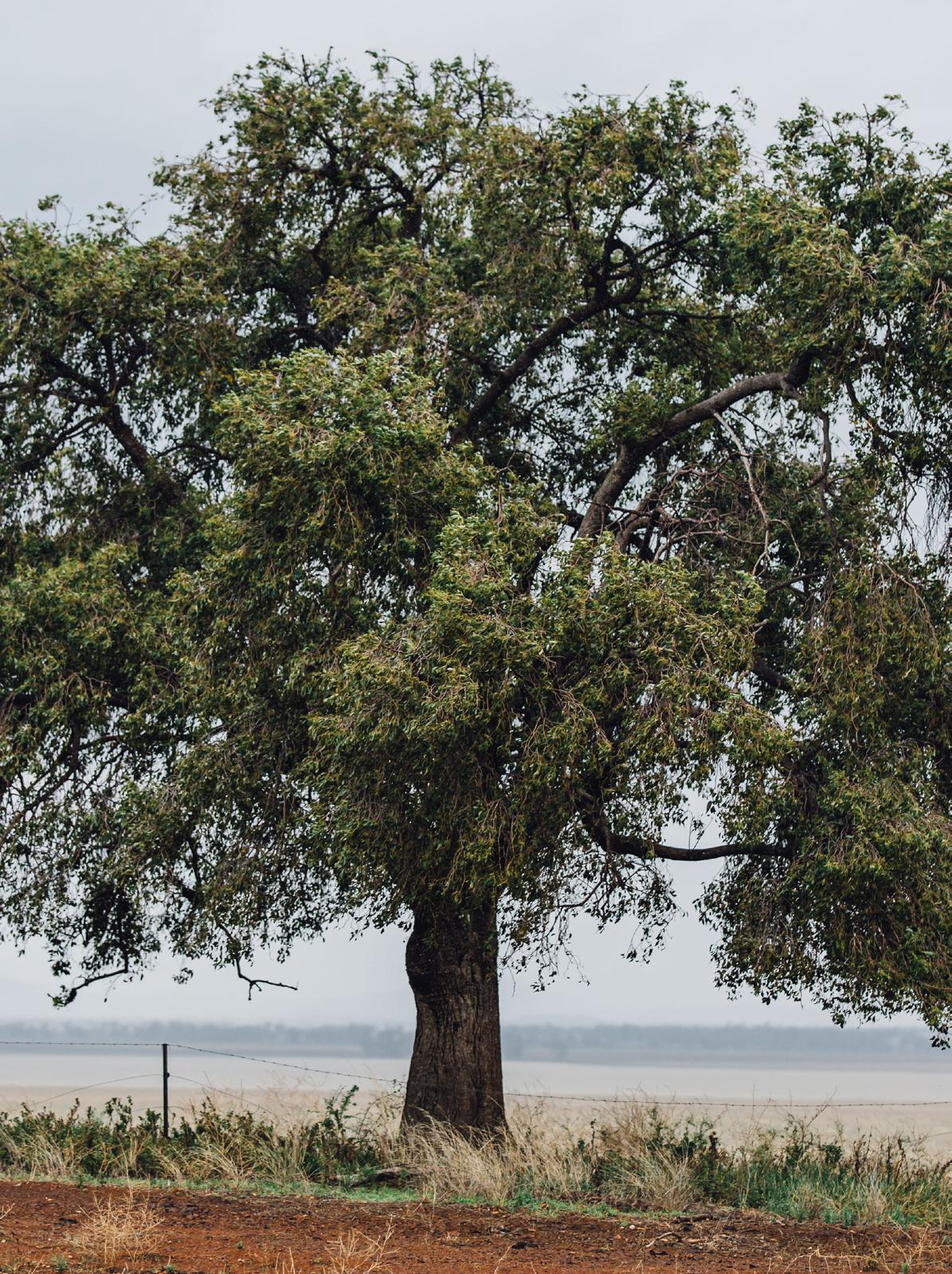
24 // GWF's 2023 Sustainability Report Producing safe, nutritious and affordable food – sustainably
Planet
Climate change poses a material risk to our businesses and their supply chains. We value nature and work to secure a safe climate and a healthy environment.
ENERGY & EMISSIONS
Our operations consume large amounts of energy and we seek to optimise and conserve energy consumption to reduce costs and greenhouse gas emissions.
We are looking to reduce our value chain emissions by working with suppliers and partners to reduce our scope 3 value chain emissions.
Climate change, Energy & Emissions
Climate change poses serious global challenges. Our approach to these challenges focuses on reducing our energy use and emissions where they have the potential to impact global climate while preparing for ongoing transitional shifts in the regulatory and physical environments that will impact our businesses, their supply chains, and the sectors in which we operate.
Our progress in 2022
– Integrating renewable energy into our energy mix
During 2022 GWF businesses continued to consider ways in which they can integrate more renewable energy into our energy mix long-term, and factor energy and carbon related risks into our decision making.
In both DON and Tip Top, advances were made in 2022 to moving to a more sustainable energy mix:
• Green energy
DON progressed the proposal for a green energy facility with the Mount Alexander Sustainability Group to the stage of receiving expressions of interest in further discussions and assessment as to the feasibility of establishing such a plant at Castlemaine, with community engagement and involvement.
CLIMATE CHANGE, ENERGY & EMISSIONS
We are investing in renewable energy to reduce reliance on fossil fuels
25 // GWF's 2023 Sustainability Report Producing safe, nutritious and affordable food – sustainably
Tip Top moving to renewable energy sources
Tip Top aims to install solar arrays at all 16 bakeries across Australia and New Zealand by 2025, at which point they will be generating around 10% of its total electricity requirements. The business has completed solar installations at its Townsville and Bendigo bakeries. Three more bakeries now have defined installation plans approved and all other bakeries will follow over the next 3 years.
Tip Top’s Procurement team is also working to purchase its remaining further energy from renewable sources, through appropriate power purchase agreements and large-scale generation certificates.
Tip Top Bakeries aims to source 50% of its electricity from renewables by 2025, by installing roof top solar arrays at its locations and negotiating renewable energy purchasing agreements

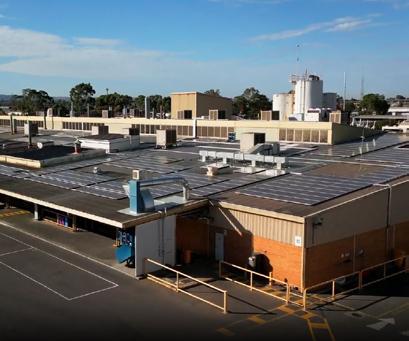
• Solar options
Tip Top and DON furthering solar options at various sites. DON is investing in new solar capacity at its Castlemaine site. Mount Alexander Shire Council has approved planning permit. Contract for construction has been approved and now DON is undertaking the needed system modelling with the network operator. Connection agreement approval would follow if final satisfactory results obtained. Our current schedule has construction commencing in May and completed in November 2023. (See case study)
– Replacement of synthetic greenhouse gas refrigerants
Businesses continued to look to the replacement of synthetic greenhouse gas refrigerants with lower global warming potential alternatives is being progressively undertaken.
CLIMATE CHANGE, ENERGY & EMISSIONS
26 // GWF's 2023 Sustainability Report Producing safe, nutritious and affordable food – sustainably
Some other key activities that comprise our climate change strategy include:
– Task Force on Climate related Financial Disclosures (TCFD)
Aligning with our parent company’s approach under the TCFD
– Incorporating climate change within strategic planning
Incorporating climate change as a focus area in our strategic planning
– Ensuring compliance with climate change related legislation
E.g., emissions reporting under National Greenhouse and Energy Reporting (NGER’s)
– Energy efficiency working groups to:
• Identify further energy efficiency opportunities (e.g., via energy audits conducted at our sites) ‒ Assist in the implementation of projects (e.g., smart LED lighting) that show business case potential to save energy, reduce carbon emissions and meet technical, financial, and operational feasibility criteria
• A forum for regular communication and knowledge transfer around energy and carbon related matters and to share learnings from around the world from our other ABF businesses
Reporting Scope 1 and 2 emissions
Since inception of the mandatory National Greenhouse and Energy Reporting (NGER) scheme in 2008/09, the GWF Australian business has reported its covered Scope 1 and 2 emissions to the Federal Government’s Clean Energy Regulator.
Decrease in greenhouse gas emissions
During this time, the business has achieved a decrease in reportable greenhouse gas emissions of 35.6% in absolute terms. This represents a decrease of 113,041 tonnes of CO2-equivalent across that period.
Decrease in energy consumption
We have achieved an overall decrease in reportable energy consumption of 455,234 GJ or 17.6% in absolute terms under NGER since 2008/09.
CLIMATE CHANGE, ENERGY & EMISSIONS
27 // GWF's 2023 Sustainability Report Producing safe, nutritious and affordable food – sustainably
Tip Top Energy Management in Bakeries

Tip Top’s bread and bakery production is an energy intensive process. To find opportunities to reduce its energy use and energy bills, Tip Top’s Chullora bakery site participated in the Energy Management System (EMS) coaching program. Tip Top was provided with an energy management system, benchmarking, and comprehensive support to improve the site’s internal energy management capabilities. The site installed a cofunded sub-metering system with the aim of collecting real-time data to better track the site’s energy use and inform decision-making.
Since adopting the new energy systems, the bakery has identified several energy efficiency opportunities and is investigating automation options to address electricity consumption during suspended manufacturing periods.

As a result of the energy savings and opportunities discovered under the EMS program, Tip Top will continue its relationship with its coaching provider into the future and has adopted a broader energy management strategy. The company is now considering the roll-out sub-metering systems for its 15 other manufacturing sites across Australia.
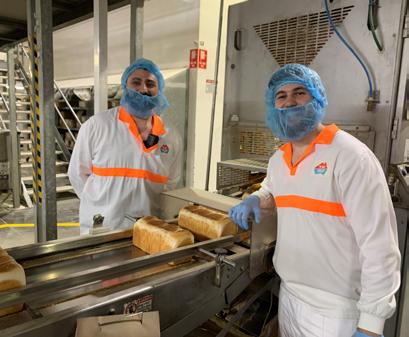
CLIMATE CHANGE, ENERGY & EMISSIONS
28 // GWF's 2023 Sustainability Report Producing safe, nutritious and affordable food – sustainably
A well-designed energy management system, benchmarking, and comprehensive support to improve the site’s internal energy management capabilities
Towards a new energy future for DON Castlemaine

Last year DON reported on its long association with the local Mount Alexander Sustainability Group (MASG), working with them over several years on a project to establish a green energy facility in Castlemaine.
MASG is a community organisation for the Mount Alexander Shire, delivering education, research, advocacy, and endorsement for shirewide sustainability and clean energy initiatives. As part of MASG’s target for reaching net zero emissions for the shire by 2030, it is planning the development of a green energy facility next to the DON site in Castlemaine. DON has confirmed its strong support for the project, signing a term sheet covering energy off-take, waste supply and provision of land. The proposed project represents the first community led waste to energy initiative in Victoria.
In addition to the green energy project, DON has also announced new solar energy investments that are expected to produce 3.5 MW and wider Energy Supply Strategy endeavours at Castlemaine; which could enable a 40% reduction in DON’s carbon footprint by 2025. There is still a long way to go with proposed project, including relevant government planning and environment approvals. However, the combination of a suitable green energy facility along with the solar project, could see a substantial change in the carbon and waste footprint for DON at Castlemaine.
CLIMATE CHANGE, ENERGY & EMISSIONS
The proposed green energy facility along with the solar project, could see a substantial change in the carbon and waste footprint for DON at Castlemaine
29 // GWF's 2023 Sustainability Report Producing safe, nutritious and affordable food – sustainably
Changing to a more renewable energy mix for DON will be a major step forward not just for DON, but also for regional food manufacturing in Victoria
CLIMATE ADAPTATION & RESILIENCE
With the changing climate and our reliance on the agricultural supply chain, our business needs to adapt and build resilience to manage the impacts of extreme weather events. We are committed to contributing to a low carbon economy climate transition and managing our climate risks and impacts.
Commitments and progress in 2022
– Integrating climate risk within Internal Audit and Risk remit
Overall, within GWF risk assessments are overseen by our Head of Internal Audit and Risk Management. Assessing climate risk and its impact on our businesses and sites is an aspect of risk assessment that has increased in importance for GWF and its businesses. Our parent ABF undertakes annual assessments on environmental issues and climate change which includes GWF and its businesses. Individual businesses including GWF can also provide climate related matters in their regular updates to ABF.
– Task Force on Climate-related Financial Disclosures (TCFD)
ABF have been briefed on the TCFD reporting (see ABF Annual Report pages 83 to 93 and the Appendix of the Responsibility Report). In 2021 ABF created a cross-functional steering committee to oversee governance of the TCFD programme. GWF is regularly engaging with ABF to understand the reporting requirements and to identify opportunities to use the reporting requirements to improve our understanding of climate related risks and how these can be managed.
– Individual business unit accountability
Each business is now responsible for identifying and managing its climate risks. GWF notes that both the Australian and the New Zealand Governments are looking at introducing TCFD type rules. GWF notes also that some of our major customers also are interested in how GWF assesses climate risk and adaption.
– Action plans to achieve Green House Gas (GHG) emissions targets
GWF already measures GHG emissions, and any current GHG emission targets are decided and set by each business based on what is appropriate and relevant. As part of the development of the climate adaption and resilience strategy for 2023, GWF will not only continue to measure our own GHG and review our major climate risks but also ask each of our businesses to be responsible for developing action plans to achieve GHG targets.
CLIMATE ADAPTION & RESILIENCE 30 // GWF's 2023 Sustainability Report Producing safe, nutritious and affordable food – sustainably
– Climate adaptation and resilience strategy
Accordingly, during 2023, GWF will develop a climate adaption and resilience strategy with the following elements:
• An overview of how we will go about assessing climate risk in our business, including clear accountabilities and consistent reporting
• Where we think, the major risks may occur – using external expertise where appropriate to improve quality of decision making; and
• Work with our customers and ABF on the best methodology for measuring GHG going forward, including the use of science-based targets and especially scope 3 emissions.
– Working with external agencies e.g. insurers
GWF are also working with external agencies, including insurers to understand their views on climate related risks and potential future impacts on sites. In 2023 Zurich Insurance will undertake specific climate impact reviews for all GWF sites based on several specific scenarios. The outcome of this will assist GWF and businesses in understanding future risks for sites with a focus on continued ability to supply product, as well as input into future capital allocations.
– Greenhouse Gas inventory
GHG inventory work will be further developed in 2023 with a view to signing up to Science Based Targets
CLIMATE ADAPTION & RESILIENCE
31 // GWF's 2023 Sustainability Report Producing safe, nutritious and affordable food – sustainably
MAURI – Western Australian Animal Feed Mill development


Animal Welfare – Regenerative Agriculture – innovation –Continuous improvement – Energy management
George Weston Foods, through its MAURI (Australian) division, has invested over $100 million in a new, state-of-the-art animal feed mill in Kwinana, south of Perth in Western Australia. This project will build on MAURI’s commitment to Western Australia by doubling its animal feed capacity in the state, with ~20 per cent of all WA grain being procured for this facility and contributing $20 million to the WA economy annually through employment alone.
Construction on the new Latitude 32 business precinct site in Kwinana began in 2020, and despite COVID disruptions the mill will be operating at full capacity in the first quarter of 2023. Animal feed for Ingham’s will also be produced at the new facility, improving operational cost efficiencies, and allowing the growing demands of customers across the pork and poultry markets in WA to be met for years to come.
This new facility will help boost the WA economy by creating jobs during construction and operations, buying local and creating training opportunities for local people. It will produce double the animal feed as previously for a much lower per tonne energy footprint.
A world class plant that will drive Western Australian animal production and food security for the future
CLIMATE ADAPTION & RESILIENCE
32 // GWF's 2023 Sustainability Report Producing safe, nutritious and affordable food – sustainably

33 // GWF's 2023 Sustainability Report Producing safe, nutritious and affordable food – sustainably
GWF’s Sustainability Framework
A devolved operating model
Like our parent ABF, GWF operates a devolved operating model. This means we operate more "bottom up" rather than "top down" if you will.
We apply the same operating model for our sustainability agenda. It is shaped by the leaders within each business who are closest to the opportunities and risks and who draw from detailed local knowledge, customer insights, and have clear ownership of actions.
It means sustainability factors are not only considered within business strategy, but they are also put into effect by people at every level of the Group who are trusted and empowered to exercise good judgement.
GWF, at a group level, assists businesses by providing a Sustainability Framework to help align approaches and areas of common positive impact and a platform for sharing ideas and best practice across businesses.
The GWF Group is in constant dialogue with the people who run our businesses, giving our businesses a detailed understanding of their material opportunities and risks, and enabling us to collaborate when making material decisions.
34 // GWF's 2023 Sustainability Report Producing safe, nutritious and affordable food – sustainably
Sustainability factors are not only considered within business strategy, but they are also put into effect by people at every level of the Group
What GWF GROUP...
...asks from our five businesses:
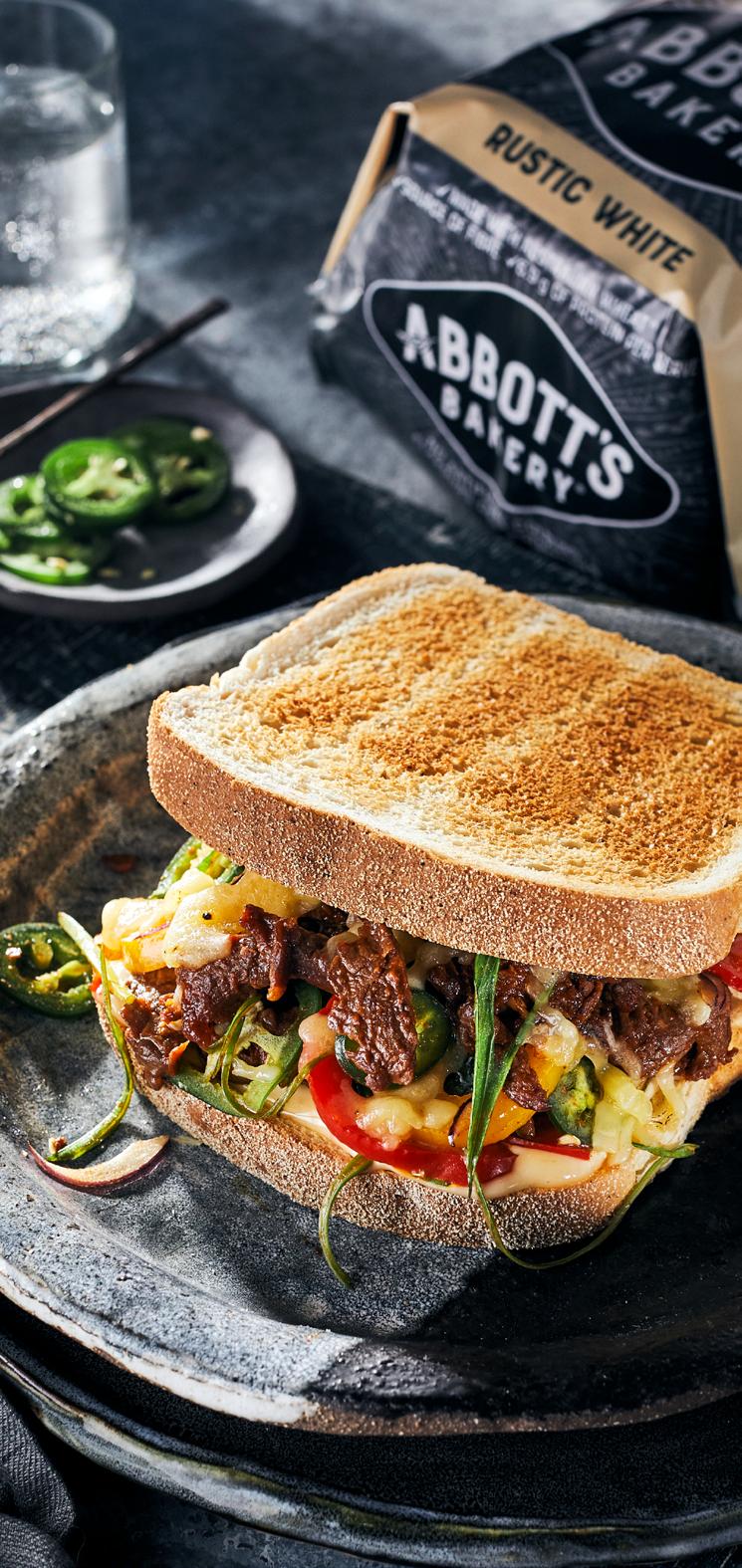
– Identify and address the environmental and social opportunities and risks that are most material to the business;
– Understand relevant stakeholder priorities and concerns;
– Work safely and with integrity, and
– Pursue continuous improvement through motivating and relevant targets.
...does for our businesses:
– Provide opportunities to share wins and learnings across GWF;
– Tap into expertise from the wider ABF Group that can aid GWF businesses;
– Aggregate our data for external reporting purposes.
35 // GWF's 2023 Sustainability Report Producing safe, nutritious and affordable food – sustainably
Our Sustainability Guiding Principles
These principles guide the impact we aim to create on society, planet, and the economy; and also provides the foundations for GWF’s Sustainability Framework.
Care for our people
Caring for our people means prioritising the health, safety and wellbeing of our team and cultivating inclusive and diverse workplaces where everyone is respected, supported, and empowered to fulfil their potential.
Create and sustain value
We create and sustain value for customers, consumers, and our own business through our high quality, healthy, nutritious, and affordable products, and through the relationships we forge with our supply chain.


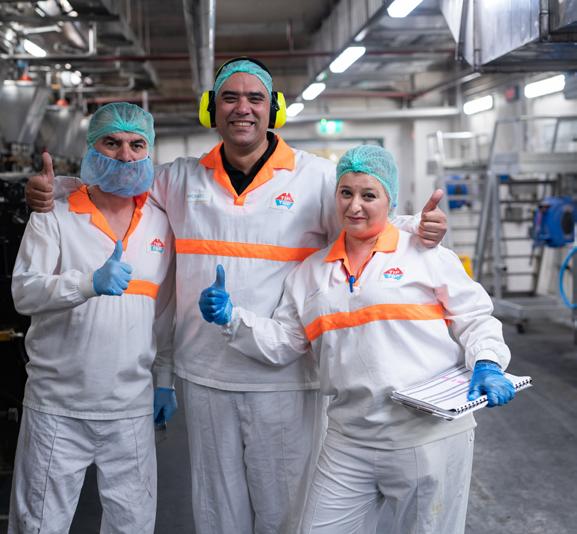
Be a good neighbour and a good corporate citizen
Being a good neighbour means looking out for the communities and natural environment impacted by our business. As a good corporate citizen, we act with integrity, work to reduce our negative impacts, and aim to do good, every day.
36 // GWF's 2023 Sustainability Report Producing safe, nutritious and affordable food – sustainably
GWF’s Sustainability FRAMEWORK
To align with our devolved operating model, sustainability initiatives are run at the business unit level and aligned centrally under a common sustainability framework, structured around what matters most for GWF, our key businesses and our key stakeholders.
GWF’s sustainability framework has three pillars (Products, People and Planet) and is underpinned by strong governance and responsible corporate conduct. A cross-business Sustainability Taskforce comprising senior representatives from each business ensures individual Business Unit sustainability plans and priorities are reflected in the GWF-wide priorities.
Business Governance
Sustainability Business Taskforce
Comprising senior representatives for each business ensuring individual Business Unit Sustainability Plans & priorities are reflected in GWF-wide plan
Group-wide Plan
Sustainability Roadmap 2023 - 2030
Sustainability Framework
Products People Planet
Priorities
Based on Materiality Assessment
– Food Security
– Packaging & Waste
– Animal Welfare
– Safety
– Inclusion & Diversity
– Human Rights & Eliminating Modern Slavery
Business Implementation
– Climate Change, Energy & Emissions
– Climate Adaption & Resilience
Cross Business Unit Working groups
Note: GWF’s Sustainability Governance processes are further explained on page 46.
Board Level
GWF leadership team
37 // GWF's 2023 Sustainability Report Producing safe, nutritious and affordable food – sustainably
Material topics
GWF’s Sustainability Framework helps to structure the most important ‘material’ topics for each of the businesses.
Material topics are the result of a comprehensive materiality assessment process to prioritise the sustainability topics that are most significant to the businesses and our stakeholders. We use the results to inform our strategy, public sustainability targets and external reporting.
This report includes the results from GWF’s 2022 Materiality Assessment undertaken with the support of sustainability consultancy Point Advisory. The assessment methodology is described on page 44 of this Report.
Our commitments and focus areas are described below and are mapped to the United Nations Sustainable Development Goals (SDGs) as they address the global challenges we face together.

GWF conducted its first Materiality Assessment in 2022 to gain an understanding of the key issues that impact our businesses and stakeholders
38 // GWF's 2023 Sustainability Report Producing safe, nutritious and affordable food – sustainably
Graeme Cutler Corporate Social Responsibility Steering Committee GWF
Our Commitments
GWF'S SUSTAINABILITY FRAMEWORK
Products
We deliver value for customers, ensuring products are safe and promote good health.
People Planet
We provide a safe, healthy & inclusive workplace, where everyone is valued, & we support thriving local communities.
Priorities
– Food Safety, Quality, & Innovation
– Product Packaging & Waste
– Animal Health & Welfare
How our Commitments Support the UN Sustainable Development Goals (SDGs)
SGD 12: Responsible Consumption & Production
SGD 2: Zero Hunger
SGD 3: Good Health & Well-being
SDG 8: Decent work & economic growth
SDG 15: Life on Land
– Workplace Health, Safety, & Wellbeing
– Inclusion & Diversity
– Human Rights & Modern Slavery
We value nature & work to secure a safe climate and a healthy environment.
– Energy Management & Emissions
– Climate Adaptation & Resilience
SDG 5: Gender equality
SDG 8: Decent work & economic growth
SDG 10: Reduce inequalities
SGD 11: Sustainable cities & Communities
SGD 12: Responsible Consumption & Production
SDG 13:
Climate Action
SGD 3: Good Health & Well-being
SDG 15:
Life on Land
SDG 7: Affordable & Clean Energy
SDG 6: Clean Water & Sanitation
SGD 11: Sustainable cities & Communities
39 // GWF's 2023 Sustainability Report Producing safe, nutritious and affordable food – sustainably
Roadmap 2023-2030 1 Materiality Assessments 5 4 Implementing Strategy Reporting & Disclosures 6 Benchmarks & Assurance 2024 & beyond 2023 2022 3 Target Setting 2 Strategy & Framework 40 // GWF's 2023 Sustainability Report Producing safe, nutritious and affordable food – sustainably
SUSTAINABILITY
TOWARDS OUR SUSTAINABILITY ROADMAP 2023-2030
As part of the continued development of our Roadmap, our Materiality Assessment is a foundational exercise in sustainability strategy, providing a robust basis for strategy development and reporting. For GWF, all its business will build on the latest Materiality Assessment in their own strategies and frameworks, with some shared aims across the Group. For each of GWF businesses, their own sustainability strategies will be known as "Sustainability Scorecards" and form part of their overall business strategies.
Reporting is also likely to be built up from the individual business units to meet varying stakeholders needs, with any shared reports on the Group’s sustainability performance using the Materiality Assessment as their basis.
Developing the GWF priorities
Having completed Stage 1 – the GWF Sustainability Framework and Materiality Assessments for GWF and each of the businesses, the rest of 2023 and early 2024 will be spent on refining strategies for the 8 key GWF priorities identified out of the Materiality Assessment, plus any business specific theme(s).
Developing a Sustainability Roadmap
By the first quarter of 2024 both GWF and each of our businesses will have developed a Sustainability Roadmap. All businesses have already begun the process of developing a Sustainability Scorecard as to their current work on sustainability issues, and this as well as the Materiality Assessment will guide them in finalising their latest Sustainability Roadmap for their business.
Each business is expected to review its Sustainability Scorecard and updates of these business strategies are included at their quarterly business reviews. These discussions of strategy are scheduled on a rotating basis so that each business unit is covered over a two-year period. Public reporting will beundertaken annually by GWF, requiring quantitative and qualitative inputs from all business units at the appropriate time.
Scorecard
41 // GWF's 2023 Sustainability Report Producing safe, nutritious and affordable food – sustainably
Every Business Unit is responsible for implementing, monitoring, evaluation and reporting on progress against their Sustainability
Data and Reporting
Data is recognised as an important enabler to sustainable Environment, Social and Governance (ESG) outcomes. GWF has been collecting data for many years and is now in the process of reviewing the data collection for ESG issues. Over the coming year, GWF and its businesses will continue to work with our key external stakeholders and ABF on what data GWF and businesses collect and report, and how they should be reported to help drive our ESG agenda. We aim to complete this process by the beginning of 2024 and begin regularly publishing relevant data to inform how we are progressing against our theme goals.
Industry Associations
Importantly, GWF will also work closely with our industry associations, such as AFGC & APCO, to develop the best policies with our federal and state government partners, as well as the broader community, across key areas of the sustainability agenda. We know that in almost all of our key focus priorities, we cannot achieve the best results for GWF, our businesses, and the communities that we operate in unless we effectively partner with government, customers, suppliers, and ABF.
Parent Company and Key Customers
We will work with our parent company, ABF, and our key customers through 2023, to ensure that GWF can both inform their sustainability strategies and where we can align our goals, targets, and methodologies.
Cross Business Working Groups
All eight key priorities identified in this report have already or will have a cross business working group to lead the development and implementation of the theme, and to assist businesses in their own implementation.
Sustainability Taskforce Steering Committee
GWF will upgrade our current Corporate Social Responsibility Community of Practice, to a Taskforce with a Steering Committee answerable to the Group Leadership Team of GWF, including the Managing Directors of each of the businesses. The Taskforce will focus on ensuring GWF and businesses have a clear sustainability strategy that works with and enhances the overall plans of GWF and its businesses. Further it will be responsible for implementing GWF’s overall sustainability strategy and assisting businesses in the implementation of their own business strategies.
In doing so we will be mindful of any current and future reporting requirements of Australian (including states) and New Zealand Governments.
42 // GWF's 2023 Sustainability Report Producing safe, nutritious and affordable food – sustainably
GWF and our businesses have commenced progressing these next steps:
4
1
5
2
3
GWF undertakes a range of Sustainability related Reporting
GWF currently undertakes or contributes to a range of reports including but not limited to:
– ABF Annual and Responsibility Reports (externally validated) in November of each year, across a range of ESG issues
– GWF, as part of the ABF group of companies operating in Australia, report publicly to the Australian Government in relation to Modern Slavery, as per the Modern Slavery Act 2018
– Yearly to the Australian Government through the Workplace Gender Equality Agency (WGEA) on gender equality outcomes
– Yearly to the Australian Packaging Covenant Organisation (APCO) publicly on packaging targets and issues
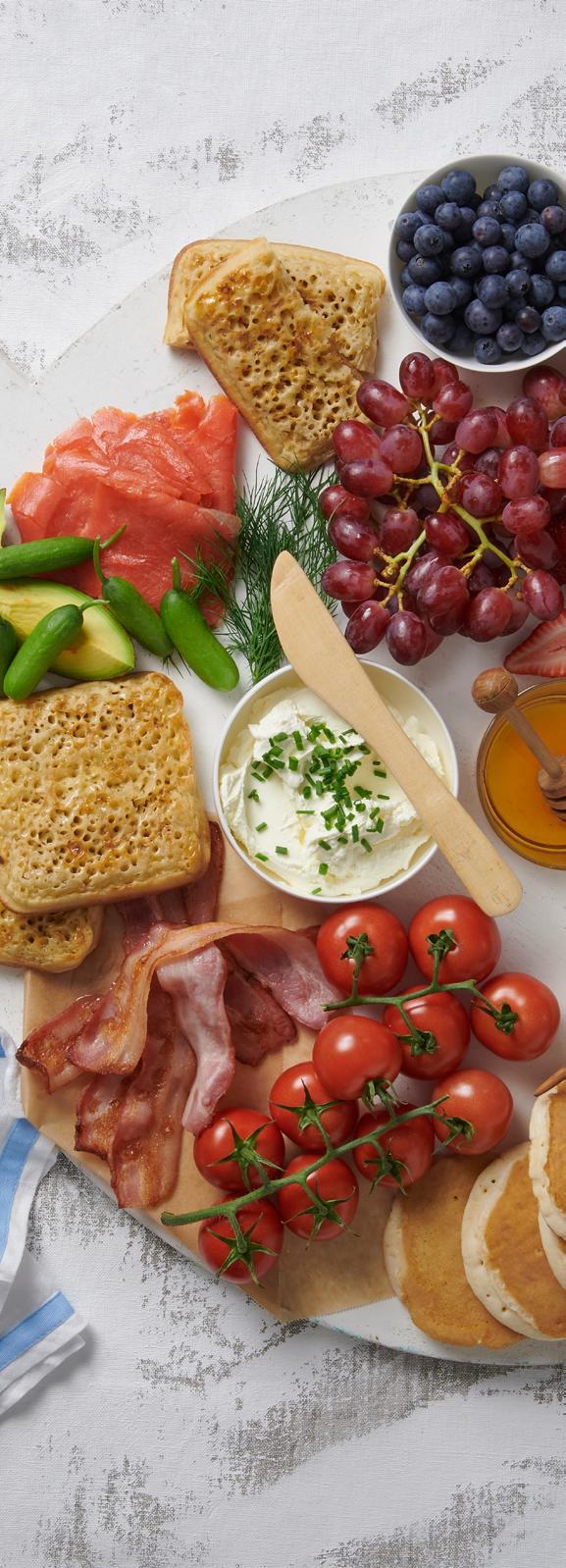
– To the Clean Energy Regulator through the National Greenhouse and Energy Reporting (NGER) scheme
GWF expects that the range of ESG related reporting will increase as both Australian and New Zealand Governments further look at the TCFD (Taskforce for Climate related Financial Disclosure) framework for risk reporting. Accordingly, GWF as part of the next stage of the sustainability process will look at how best to bring these various reporting measures together in such a way that ensures that we can report holistically to our Australian and New Zealand customers, suppliers, and key stakeholders.
43 // GWF's 2023 Sustainability Report Producing safe, nutritious and affordable food – sustainably
Materiality Assessment
To support the development of our Sustainability Framework, GWF undertook a Materiality Assessment in mid-2022, with the support of sustainability consultancy Point Advisory. In undertaking this Materiality Assessment, we have applied the Global Reporting Initiative (GRI) Standards.
The assessment found that the most important material topics:
Most important to Stakeholders
Value for money, market presence and food security were especially important to stakeholders
Overall Food safety, product packaging and innovation
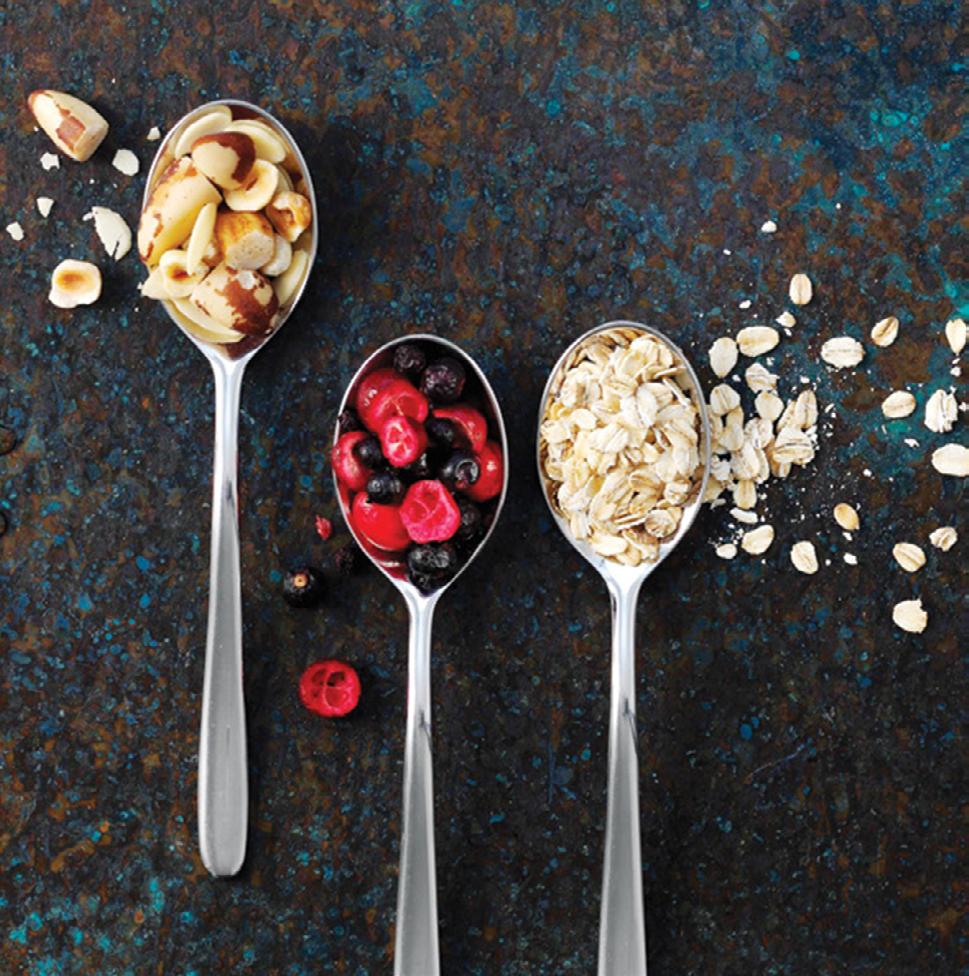
Most important to GWF
Workplace health, safety, and wellbeing; animal health and welfare; waste management and energy management
44 // GWF's 2023 Sustainability Report Producing safe, nutritious and affordable food – sustainably
Materiality Assessment findings
Several clear priorities emerged from the assessment. GWF’s mission of ‘doing good, every day’ is reflected in the priorities of food safety and security and product packaging, both highly material topics for GWF and key stakeholders, including employees.
Innovation in product development and packaging is seen by GWF and its stakeholders as important opportunities for GWF to meet its sustainability objectives and grow market presence in Australia and New Zealand. Product value for money is increasingly important for stakeholders, as recent economically challenging times have shown GWF’s food products provide quality and nutrition at an accessible price point. This is consistent with GWF’s core principle to create and sustain value
As one of the largest food manufacturing employers in Australia, there are clear expectations and appreciation from stakeholders for GWF’s role in supporting local job creation. Consistent with GWF’s core principle to care for our people, the key theme of workplace inclusion and diversity was expected not just by employees but increasingly, by customers. Workplace health, safety and wellbeing was found to be a highly material topic for both GWF and its stakeholders. Unsurprisingly, the topic was ranked as number one people-related topic by employees. In addition, stakeholders and in particular customers, expect transparency across the supply chain to ensure human rights are upheld and modern slavery risks are addressed through various mechanisms such as procurement requirements and ingredient disclosures.
In terms of the environment, customers are increasingly interested in understanding how GWF, as a large market player, can help to contribute to their own environmental goals as part of greenhouse gas emissions reduction through the value chain including the company's climate adaptation and resilience strategies to reduce energy consumption, food waste and overall emissions.
Animal health and welfare whilst mostly relevant for DON and Tip Top brands, is highly material across GWF and significant for key stakeholders.
Additional current and emerging areas that require ongoing focus include reporting and cybersecurity. Stakeholders, particularly customers see opportunities for industry collaboration to innovate for packaging and limiting emissions.
45 // GWF's 2023 Sustainability Report Producing safe, nutritious and affordable food – sustainably
Our governance
GWF operates in a decentralised model with distinct business units, employing a range of governance measures both at the individual business unit level and consolidated GWF Group level, as well as following the overarching governance framework of our parent Associated British Foods.
The following are general governance frameworks within GWF:
– GWF Group Leadership
Comprising GWF CEO and several direct reports oversees the consolidated GWF Group and is responsible for the Group’s strategy and governance
– Business Unit Management
Each Business Unit has a Management Leadership Team that oversees the operations, performance, and governance of their specific business; these teams meet at regular intervals
– Quarterly Governance Meetings
GWF Directors hold quarterly governance meetings to review compliance across several areas including tax, occupational health and safety, IT security and privacy, environmental, legal and treasury
– Internal Policies
There are numerous internal policies and procedures covering areas including whistleblowing, anti-bribery and corruption, competition law, privacy, safety, and the environment, as well as a Supplier Code of Conduct which deals with responsible sourcing obligations and modern slavery
46 // GWF's 2023 Sustainability Report Producing safe, nutritious and affordable food – sustainably
Compliance Checks and Training
GWF employees are required to complete relevant online training and assessments on internal policies to maximise compliance. There are also several Director signoffs in financial statements including compliance with modern slavery policies in relation to more specific areas GWF adopts the following:
• Financial Market Risk
For key financial market risks GWF has established several specific business unit Risk Management Committees to oversee credit, foreign exchange, and commodity price management. Each Committee meets at least monthly, consists of Senior Executives, and operates under a clearly defined charter
• Group-wide Risk Management
There is also a GWF Group wide Risk Management Committee for energy sourcing and pricing
• Tax Governance
A Tax Governance Committee oversees GWF Group and broader Australia and New Zealand related party tax risks and compliance. This Committee meets at least quarterly and consists of senior GWF Executives and operates under a clearly defined charter. The overarching tax governance is established by the Tax Governance Policy which has been reviewed by GWF Directors and Senior BU (Business Unit) Finance Leaders. There are tax service agreements in place between the GWF Group Tax Function and each business unit and the shared business services centre to document the roles and responsibilities for tax including compliance.
• Legal Compliance Supported by Training
Legal compliance is supported by regular training provided to the business across a range of areas, use of standardised contract templates, internal processes requiring the legal review of third-party contracts, the use of a contract execution form for all contracts to highlight risks, as well as regular engagement across the business when disputes or other matters with legal risks arise.
• Internal Audit
An independent internal audit function and externally sourced specific audits are an integral part of the overriding governance program.
–
47 // GWF's 2023 Sustainability Report Producing safe, nutritious and affordable food – sustainably
About GWF
GWF is one of Australia and New Zealand’s largest food manufacturers employing more than 6,000 people across 43 manufacturing sites, including a significant presence in regional areas. Additionally, we have a broad supply chain of businesses that we partner with to deliver our products.
Our products are diverse and include leading brands such as Tip Top, Abbott's Bakery, Bürgen®, Big Ben, Dad's Pies, DON® Smallgoods, Yumi's and much more. Through our MAURI business, we are one of Australia’s leading suppliers of flour, bakery ingredients and animal foods. We support parts of the local operations for other brands on behalf of our parent company.
GWF is a wholly owned subsidiary of Associated British Foods Plc (ABF), a diversified international food, ingredients, and retail group with operations in 52 countries across Europe, Southern Africa, the Americas, and Asia Pacific.
We have been part of the food landscape in Australia and New Zealand since the 1930’s.
6,000+ people 43 sites across Australia and New Zealand
4 out of 5 households in Australia buy a Tip Top branded product
1.5M kilograms of chickpeas used by Yumi’s in 2022 all sourced from Australian farms

48 // GWF's 2023 Sustainability Report Producing safe, nutritious and affordable food – sustainably
GWF site presence across Australia and New Zealand
Western Australia
Bentley
Canning Vale
Northam
O’Connor
South Australia
Dry Creek
Port Adelaide
Murray Bridge
Victoria
Castlemaine
Bears Lagoon
Bendigo
Girgarre
Port Melbourne
Braeside
Dandenong
Hallam
North Melbourne
Truganina
35M pies and sausage rolls from Big Ben & Dad's Pies were sold in New Zealand - that’s 7 pies for every Kiwi every year

Queensland
Townsville
Carrarra
Capalaba
Hemmant
Moorooka
Springwood
Toowoomba
New South Wales
Head Office (Sydney)
Camellia
Charmhaven
Chullora
Enfield
Ermington
Wetherill Park
Otahuhu
Ellerslie
Hamilton
Wiri
Wellington
New Zealand
Christchurch
Rangiora
100% of the wheat we buy is used for either human or animal feed, meaning almost zero waste to landfill
1.7M loaves of bread donated by Tip Top and 2.7M meals (equivalent) were donated by GWF business to aid Foodbank
49 // GWF's 2023 Sustainability Report Producing safe, nutritious and affordable food – sustainably








































